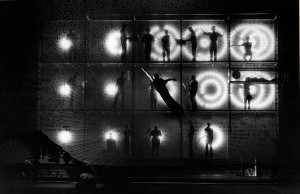Interview: Handstands with Bassem Youssef, political satirist
Bassem Youssef – Interview by Grace, 21st Century Artist Intern| UMS presents from UMS (University Musical Society) on Vimeo.
Grace Bydalek, UMS 21st Century Artist Intern, spent the summer in New York City as an intern with creative producers Pomegranite Arts. Grace interviewed Bassem Youssef, the political satirist exiled from Egypt, while doing handstands.
Bassem Youssef is at the Michigan Theater in Ann Arbor on November 6, 2017.
Student Spotlight: Embedded with Taylor Mac and Pomegranate Arts
Editor’s note: As part of the UMS 21st Century Artist Internships program, four students interned for a minimum of five weeks with a dance, theater, or music ensemble part of our 2015-2016 season. Tsukumo Niwa is one of these students. This summer, he was embedded with the artist Taylor Mac and the production company Pomegranate Arts.
Below, Tsukumo shares her travel stories in New York City and beyond ahead of Taylor Mac’s performance in Ann Arbor on February 5, 2016.
This summer, through the UMS and U-M School of Music, Theatre & Dance 21st Century Artist Internship program, I had a chance to work closely with Taylor Mac and Pomegranate Arts in New York City.
A little bit about myself: I’m a junior majoring in Oboe Performance and International Studies. As such, theater arts – let alone drag performances – are a bit out of my specialty area. When I was first introduced to Taylor’s work, however, I was immediately intrigued by Taylor’s commitment to inclusivity, especially in terms of LGBTQ+ identities, and judy’s beautiful presence on stage with glittery and flashy costumes and make up. (Taylor uses “judy” as a gender pronoun.) Because I dedicate a lot of time to social justice education as well as music, I wanted to see how arts and social justice ideas can meet.

Taylor Mac performs. Photo courtesy of the artist.
International Festival of Arts & Ideas
The first week of internship, I attended my first Taylor performance at the International Festival of Arts & Ideas in New Haven, Connecticut. Held each year on Yale University campus, this festival brings in world-class artists and thinkers across genres. This festival commissioned the 1996-2006 decades of Taylor Mac’s 24-Decade History of Popular Music will eventually become an epic show performed over 24 continuous hours (in Ann Arbor, Taylor will focus on the 1960s, 70s, and 80s). The section at the festival was called “Songs Popular in the Radical Lesbian Circuit.” It was the opening performance.
On the day of the performance, six musicians, the company tour manager, and I took the Metro North together from Grand Central to New Haven. Some passengers noticed our gear, and asked if we’re musicians. Viva, the band’s “guitar goddess” interacted with her:
Viva: “Yes! We’re performing at Yale.”
Woman: “Cool, I might check it out! What kind of music?”
Viva: “It’s cabaret music from the 90’s.”
Woman: “Okay!”
Viva: “… popular with the radical lesbians.”
Woman: “…Oh.”
Viva: “You should totally come check it out!”
Woman: “Okay, I’ll try…?” *quickly escapes the scene*
While this woman wasn’t in our audience, we had a really good turnout, including donors in VIP seats with their jaws dropped as they experienced Taylor for the first time. We heard that one of the festival founders – a woman in her 80’s – attended the performance and left the house “glowing.” Almost everyone from Pomegranate Arts (the management company working with Taylor Mac) came to see the performance and to support Taylor. The support and reactions from the audience added to the energy of the performance by Taylor and judy’s band.
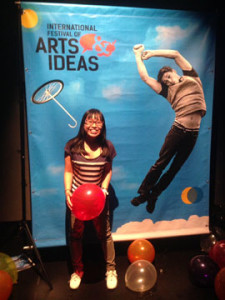
Me at the after-party, with performances by drag queens and dance music from the 90’s. It was fun!
Projects at the Pom Office
When I wasn’t at Taylor’s performances, I worked at the office of Pomegranate Arts, an independent management company that manages contemporary artists such as Sankai Juku and Philip Glass (both are familiar to the UMS audiences! Sankai Juku return this season October 23-24, 2015). With only 6 employees, it’s a small yet strong group that organizes shows and tours from start to finish.
With the help of my mentors, Linsey and Katie, I made a prototype of the project book for Taylor’s “A 24-Decade History of Popular Music.” Since “A 24-Hour History” is a huge project involving multiple parts, it’s necessary to keep them organized – costumes, stage directions, performance history, and song lists for each decade. Linda Brumbach, the founder and president of Pomegranate Arts, met with me to help me understand diverse topics what Pomegranate Arts is about, and what young artists like ourselves can do (watch for an interview soon!).
I also got to use my Japanese skills and helped to prepare visa documents for Sankai Juku company members. I can’t wait to finally see them in October!
Celebrate Brooklyn!
August 1, 2015 was the first time that Pomegranate Arts produced an outside show, and I was lucky to be a part of it. This was a huge one – 12 musicians on stage, 24 burlesque dancers strip teasing, and dozens of musicians from Brooklyn United Marching Band. About 2,000 people showed up for this free concert, ranging in age from toddlers to the elderly.
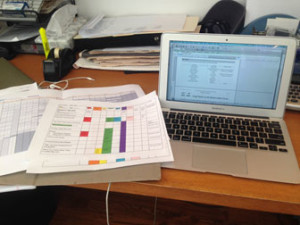
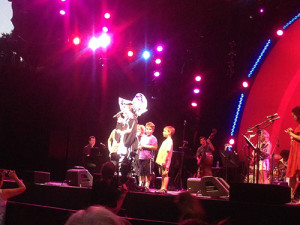
Photos: On left, my desk, with documents about “A 24-Decade History” project and project book on screen. On right, Taylor instructed these kids to (friendly) insult each other. The terrified look on their faces were priceless!
This was a huge day for me, too. As an intern, I was responsible for guiding all musicians and dancers backstage, hiring the videographer to film the rehearsal and mini interviews with artists, and just being available for anything the company needed. This was rewarding – I got to hear so many interesting stories from the musicians that have been working with Taylor for years, as well from as key people from Pomegranate Arts. One of my favorites was Machine Dazzle, the costume designer.
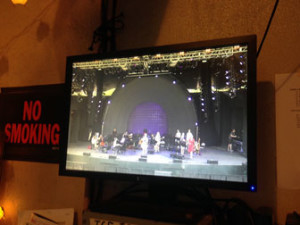
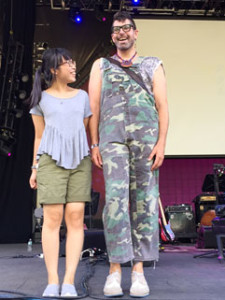
Photos: On left, dress rehearsal, seen through the backstage monitor. On right, Machine Dazzle, costume designer for Taylor Mac. He’s really tall. Or maybe I’m really short. Most likely both.
At this performance, a lot of things happened. Audience members were frequently brought to the stage and did various ridiculous things that Taylor asked them to do. They split up and shouted at each other, representing the pro-war and anti-war forces. The Brooklyn United Marching Band came on stage, 36 strong, and blew everyone in the crowd away.
Under Construction Series at the Park Avenue Armory
The final set of performances that I attended were totally different from the Celebrate Brooklyn! performance. They took place in the intimate and historic Park Avenue Armory, which accommodates artists that strive to create artworks that are difficult to present in traditional theaters and museums.
Since Taylor and Machine are resident artists at the Armory, they have access to one of the company rooms and store all the costumes and other materials related to “A 24-Decade History” project. It is really glittery, a bit messy, and awesome!
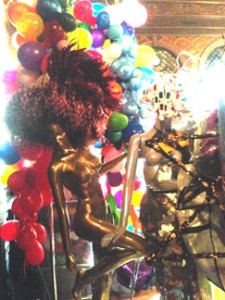
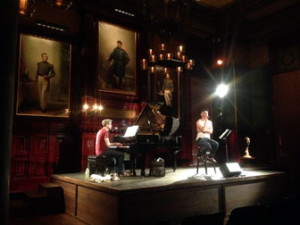
Photos: On left, just a few of the costumes living in the Armory! On right, the historic Board of Officers Room in the Armory. The walls are wooden, and acoustics are amazing for low-voice singer and piano! On piano is Matt Ray – the musical director.
There, they performed three decades that they have never performed before: 1776-1786, 1786-1796, and 1796-1806. Since these are near the dawn of US independence, many songs performed at these performances were patriotic. Taylor wore no costume for this performance; instead, some of the costumes were displayed stage-side so that the audience could imagine what this performance will look like as a finished work.
On the second night of this performance, during the “encore”, Taylor performed a song called “Pussy Manifesto” by Bitch and Animals from the 1996-2006 decade. During this song, he asks the audience to explore our various “pussies,” regardless of gender, in positive light. While Taylor asked the audience to explore our “mouth pussies” and sing the last phrase of the song, one audience member – a middle-aged man – showed strong discomfort. In response to this, Taylor said, “Whatever you’re feeling is appropriate,” meaning that audience members don’t have to necessarily like the performance. They could feel uncomfortable, disgusted, confused, or have any other emotion. Regardless of these emotions, as a theater artist whose art serves to challenge daily narratives, judy will have succeeded. This was quite a lesson for me.
Bringing This (Back) to Ann Arbor
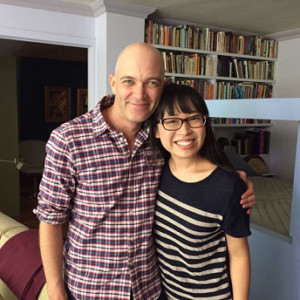 One of the biggest takeaways from this internship is that performances don’t always have to be perfect. Taylor calls judy’s performances “workshops,” implying that judy brings the performances closer to perfection through testing with the audience members. It takes courage to present something that you know isn’t perfect, and as a classical musician myself, I usually would not take this approach. However, now I feel more compelled than ever to show my imperfection, with the knowledge that I can get better with the help of audience and constructive feedback.
One of the biggest takeaways from this internship is that performances don’t always have to be perfect. Taylor calls judy’s performances “workshops,” implying that judy brings the performances closer to perfection through testing with the audience members. It takes courage to present something that you know isn’t perfect, and as a classical musician myself, I usually would not take this approach. However, now I feel more compelled than ever to show my imperfection, with the knowledge that I can get better with the help of audience and constructive feedback.
Speaking of audience, Taylor’s performances are full of audience interactions. Audience members can’t sit in their seats without doing something, whether it be manspreading, singing with Taylor and the band, or even sometimes slow-dancing with another audience member. Kids, elderly, moms, and LGBTQ+couples, and everyone in between get pulled to stage. Prepare to be challenged, and be comfortable being yourself.
Taylor Mac performs in Ann Arbor on February 5, 2016.
Interested in more? Explore more photo essays by students embedded with UMS artists.
How to produce Einstein on the Beach
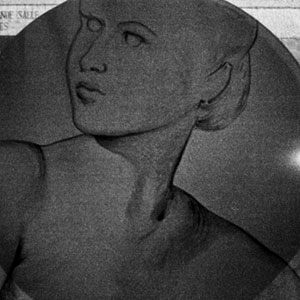 Photo: Section of a drop in Einstein on the Beach.
Photo: Section of a drop in Einstein on the Beach.
Mel Brooks’s “Producers” they’re not. “No way we’ll become become rich on this,” Linda Brumbach said yesterday at UM’s B-School in a 90-minute public conversation about the ins and outs of producing Einstein on the Beach. Brumbach is the head of Pomegranate Arts, the tiny production company that’s taken on the near-impossible task of bringing Einstein to the stage here in A2 and in 10 other venues around the world. The tour ends in Hong Kong in March 2013, and Brumbach says she’ll consider it an artistic success if “Bob, Phil, and Lucinda get the piece they want.” That’s Robert Wilson, Philip Glass, and Lucinda Childs, the artists who gave birth to the monumental opera in 1976 and have seen only two revivals since then.
After yesterday’s session, I understand why. The 1976 premiere of Einstein cost $750,000, and Wilson had to put huge chunks of that sum on his American Express card and then plead with Amex to waive interest charges. Glass had to sell the score to offset costs.
This week’s production costs a staggering $2.5 million—and that doesn’t include touring expenses. UMS President Ken Fischer said that for UMS to make money on this, “we’d have to charge $500 a ticket, and we’re not about to do that.” “I don’t think anyone can actually make money on Einstein on the Beach,” Brumbach added.
Why the exorbitant price? Consider:
• The model for Einstein’s sets costs as much as $90,000
• It takes three freight containers to ship the production
• Props include 600 pounds of dry ice
• Costumes include 30 pairs of converse high-tops
• Tech rehearsals require three solid weeks at the Power Center (the other day, Wilson spent 14 hours lighting just one scene)
• Load-in at each new venue takes three days
• Contracts for touring venues contain a 26-page technical rider
• European venues are operating in euros
• 35 press agents are needed to promote the opera worldwide
• In A2, the production requires 65 company members and 35 local stagehands
For Brumbach, the dream of producing Einstein is 12 years in the making. She first set out to revive the opera in the early 2000s, but 9/11 and its aftermath halted those plans. In 2007, it looked as though New York City Opera would partner with Pomegranate to stage the work, but the opera company’s budget was slashed and the season cancelled. A promised Paris production went nowhere. It wasn’t until UMS’s Michael Kondziolka said to Brumbach a year or two ago, “We’ll do it,” that she saw a way.
UMS is one of seven co-commissioners—three in the U.S., one in Canada, the rest overseas, and all of them “friends,” says Brumbach—who’ve gone in with Pomegranate to make this week’s historic preview performances (and subsequent tour) happen.
They’re still teching inside the Power Center as I write. One last drop is being repainted in Detroit and will be delivered to the theater at 2 pm Friday. There’s more than an element of brinksmanship to all of this. I wouldn’t want to be in Brumbach’s shoes just now, but I’m quite eager to witness her dream-come-true this weekend.
Inside Einstein on the Beach: Guest Blog by Lindsay Kesselman
Editor’s Note: Lindsay Kesselman will sing with the Phillip Glass Ensemble for the duration of the 2012-2013 international tour of Einstein on the Beach. She’ll also be guest blogging on umsLOBBY. Einstein on the Beach is part of Pure Michigan Renegade.
For those of us in the chorus, the anticipation has been building for six months. Six months of waiting, imagining, preparing, and eagerly counting down. Now, on December 27th, it is crazy to think that the anticipation is over and we are already completely immersed in Einstein, having just finished three weeks of rehearsal in New York.
For so long, this project existed on a distant horizon, one it seemed we would never reach….for months now friends near and far have been asking, “So…how’s Einstein going?” …eager for details about the music, the people, the challenges, and I have had to respond, “Oh…actually, we haven’t started yet.” Now, and in the blink of an eye, we are well underway, having learned all of the music, all of the original staging, and even having begun to memorize much of the material. Where did the time go?
The last three weeks are a blur of long, satisfying days, approximately 90 hours of rehearsal, of becoming familiar with and beginning to master our music, learning to move in completely foreign and fascinating ways, and finally: being able to imagine what it will feel like to sing this show from start to finish.
To say that it is a challenge is a HUGE understatement. The piece makes physical, vocal, and mental demands which are completely unique and which are definitely creating new standards for us as artists, performers, and people. We sing faster, more continuously, and more rhythmically than we ever have before, all while moving in incredibly intricate, stylized, and intentional ways, and the mental focus we need to maintain for four-and-a-half hours (the duration of the performance) is truly staggering. Every night in New York we left rehearsal feeling drained, mentally and physically, without an ounce more energy to give. And…it felt fantastic.
There are a few singers in the chorus, as well as instrumentalists, stage managers, and sound specialists, who were part of the 1992 tour (and earlier productions) of this piece. Throughout our rehearsals, these members of the chorus shared memories with us about their past Einstein life (or lives). From spending hours in rehearsal holding uncomfortable positions while Robert Wilson got the lighting just right, to audiences cheering in Japan and throwing tomatoes in Barcelona, we heard countless stories and began to understand the enormity of this piece re-constructed now, and what a huge impact this experience will have on all of our lives.
The first day that Dan, our front-of-house mixer, sat in on rehearsals with us, he was moved to tears while hearing this music again after such a long absence. Our producers from Pomegranate Arts came to rehearsal regularly after long days at the office where they had been working on all of the many details for our tour, just to bask in the singing, the dance, the acting. They have been dreaming of this revival for the last 12 years, and FINALLY it is coming to fruition. Seeing these reactions, we felt even more determination to do this piece justice. For Dan, for Pomegranate Arts, for Lucinda, Robert, and Philip, for all of the people who have loved this piece for a long time, and for those lucky new fans who will be intrigued for the first time.
It is a huge responsibility, and one we are taking very seriously. All of us, singers, dancers, and actors alike, are pushing ourselves to the limit. Even when our directors are satisfied and pleased with our progress for the day, we keep pushing, insisting we can do better- sing more perfectly in tune, make rhythmic changes more seamlessly, and memorize more quickly.
I feel so fortunate to be surrounded by such warm, friendly, diligent, fun-loving and extraordinarily talented group of people. We are having a blast and becoming a family, and it will be a privilege to spend the next year and a half traveling the world and singing this piece with them. Next stop: Ann Arbor, where we will meet Robert Wilson, rehearse for 3 more weeks in the Power Center, and bring Einstein on the Beach to the Midwest!
Have a question for Lindsay, or curious about something to do with Einstein on the Beach? Use the hashtag #askeinstein on Twitter or comment below.


